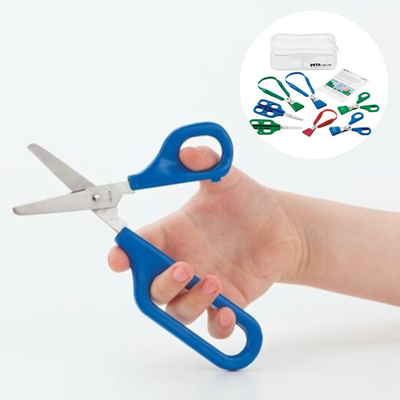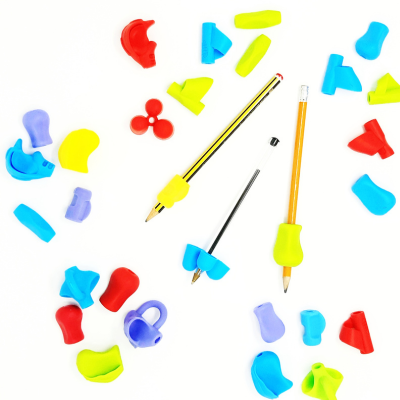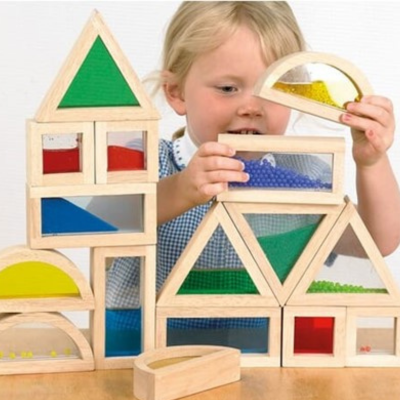Activities for developing children's fine motor skills at home
In this blog post we will look at activities for developing children's fine motor skills at home.
Fine motor skills are crucial for a child's development. From holding a pencil to tying shoelaces, these skills are fundamental for everyday tasks. There are a number of fun and exciting activities that can be used to support and develop fine motor skills at home. Let's explore some of them now.
Art and Craft Activities
One of the best ways to engage children in an activity is to make it fun. Drawing and colouring is a simple way to develop fine motor skills and have lots of fun. Choose drawings from favourite television characters, toys, or images that excite and engage children. This will help make the activity more fun and will spark more enthusiasm to try new things. Introduce more challenging designs as skills progress or change to painting or using chalks to explore different textures and effects. Our writing grips can also be used on pens and paintbrushes, helping to develop pen control across a range of activities.
Activities involving cutting and sticking offer an alternative to drawing but still promote fine motor skills. Get prepared and ensure you have a clear space to get messy! Use a variety of materials like paper, cardboard and fabrics for practising cutting different textures. This helps enhance hand-eye coordination and hand dexterity. You can always introduce glitter, stickers or foam shapes to add more interest. Peeling the backs off stickers is another great way to help develop those fine motor skills and precision.
Writing Tools
Although it can be challenging, writing is a great way to improve fine motor skills, and writing grips are the perfect support tool. Available in different styles and fitting both the right and left hands, they provide comfort and grip, giving the user more control over their handwriting. Simply pop them on a pen, pencil or even paint brush to help your child practise the correct hand position and learn to form shapes, lines and even letters. You could even try creating patterns and drawing shapes in a sand pit if you have access to one. The different textures and creative element makes for great fun.
As an alternative to writing, why not try tracing exercises? Use fingers to trace shapes, lines and letters, improving control and precision. If your child likes messy play it's a great opportunity to explore textures and create paths with your fingers in things such as glitter, silly slime or foam. You could even create a racing game for extra fun - who can complete the track first?
Finger Activities
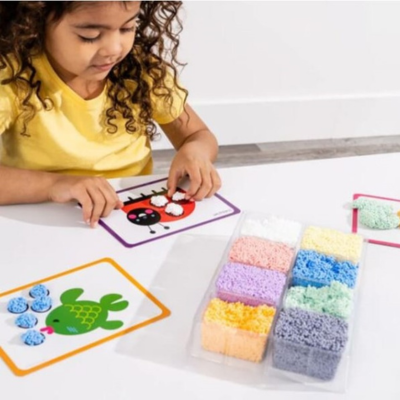
A firm favourite of many households is playdoh, playfoam, putty or modelling clay. They are fantastic child-friendly sensory play products that help strengthen fingers and enhance fine motor skills. Our non-toxic, non-oily and latex free putty is available in 4 strengths ranging from soft to firm. Squeeze, stretch, twist or pinch to make different shapes whilst developing finger strength. For a different texture, try Playfoam. The no mess, non-toxic, bead-like structure that never dries out encourages imaginative thinking. Your child can squash and sculpt away, with a range of kits available including ones to practise shape, number and letter formation.
Developing fine motor skills doesn't have to have a big price tag. We stock a range of quality Tangles and fidget toys that can be squashed, pulled, twisted and rolled to improve dexterity. Not only are they great fun and aid concentration and focus but they help develop finger strength. Try different shapes, textures and sizes to encourage sensory exploration and get fingers working.
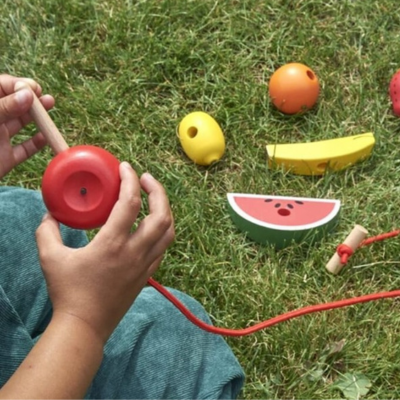
Staple products such as threading and lacing activities are great for developing motor skills as well as counting, sequencing and colour recognition. If you haven't got access to these at home, try threading pasta onto string to create necklaces or bracelets. To really get those fine motor skills working why not try painting the pasta first, using writing grips to support fingers and wrists, and then thread onto string.
Fine Motor Games
Using fun games and activities to practice fine motor skills can help reduce anxiety and frustration. This makes the process fun and rewarding. Puzzles, building blocks, and games are great at helping do just this. Build towers from coloured, translucent blocks - who can build the tallest tower? Learn about animals, modes of transport and things that go together in our colourful, chunky puzzles. Or try our fantastic wooden role play products and learn to cut bread, vegetables and pizza.
Outdoor Activities
Why limit activities to inside the home? There are many fine motor activities that can be done outside, providing opportunities for different areas of learning and development. Gardening is a fantastic way to practise fine motor skills and communication.
Get your child to help plant and look after the garden, including fine motor activities like digging, picking and planting seeds and watering. You can also set up simple obstacle courses that involve crawling, climbing, balancing and gripping to boost coordination.
Consistency & Encouragement
As with all new skills practise and encouragement is key. In a home based setting it's easier to engage your child with topics that they are interested in, so it seems less of a challenge. Encourage and celebrate their progress, boosting their confidence and motivation to continue practising.





